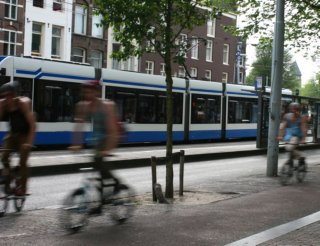
Funding | Accell Group |
Project | Smart Connected bikes - User Experience |
Timeline | 2020-2024 |
Supervisor | |
Daily supervisor | |
PhD student |
Abstract
The Netherlands is well-known for cycling. All together the Dutch own over 22 million bicycles with a population of 17 million people. Electric bikes (e-bikes) are rapidly growing in popularity in the Netherlands since its introduction in the late 1990ies. The growing popularity (of powerful) e-bikes has many advantages but at the same time the number of traffic accidents with (mainly elderly) e-bike users has grown rapidly.
The University of Twente is collaborating with Accell Group, TU Delft and Saxion and TNO in the Smart Connected Bike programme to make cycling smarter and safer. Accell group is a large European bicycle manufacturer and produces and distributes bicycles through several brands, including the electric-bike pioneer-brands Haibike and Sparta. The research collaboration aims to explore, develop and test a connected bicycle ecosystem combining the capabilities of sensing, wireless technology and data science to make bicycle use more safe, reliable, and comfortable. A key ingredient for a bicycle centric eco-system is the vision of an Internet of Things (IoT) ecosystem in which data is collected, shared, combined with other sources of data, and made available to establish new services and provide information and feedback to the cyclist.
This PhD project will examine the user experience of smart connected bikes based on large-scale field tests. Applications of Smart Connected Bikes platform could provide safety information such as collision avoidance warnings, communication with traffic signals to provide improved bicycle detection as well as to convey traffic information to bicyclists. An important part of the user experience research is the development of a user community (commuters, elderly people) for testing the developed cycling innovations, in collaboration with local and regional governments.
This PhD project is funded by the Dutch national research council (NWO) in the Smart Industry research programme, where academics work together with companies on themes where big data, smart industry and creative industry intersect. The PhD project is part of the Smart Connected Bike research and innovation programme led by Prof. Paul Havinga, Pervasive Systems group, Dpt. of Computer Science, University of Twente and prof. Karst Geurs, Transport Engineering and Management Group, dpt. of Civil Engineering, University of Twente.
More information: k.t.geurs@utwente.nl
